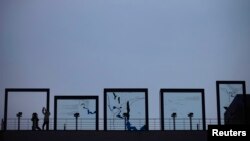Internet users are reporting an inability to access North Korea-based websites.
Computer servers hosting websites of the .KP domain have not been reachable since early Wednesday, Asia time, except for a brief period early Thursday afternoon.
The source of the trouble is not known and there has been no announcement from Pyongyang.
Websites affected include the Korean Central News Agency (KCNA), the daily newspaper Rodong Sinmun and the Air Koryo airlines. Sites in China and Japan hosting North Korean propaganda sites have not been affected. The isolated country's radio and television broadcasts have also been operating normally.
Analysts say the Rodong Sinmun site suffers outages once a month on average, while KCNA has disappeared once every several months. The outages typically last from a few hours up to one day. But it is apparently unprecedented for all North Korea-hosted websites to go down simultaneously and for such a long time.
North Korea's media, which are state controlled, has not mentioned the extended website outage.
An article in Russia's ITAR-TASS news agency, datelined from Pyongyang, blames "a powerful hacker from abroad" for the outage. The report cited an "informed source," but gave no details.
South Korea's Unification Ministry, which is tasked with relations with the North in lieu of diplomatic ties, told VOA it has no information on a possible cause for the extended outage.
The outage apparently involves the entire range of North Korea's assigned IP addresses [175.45.176.0-175.45.179.255].
Only a tiny percentage of the North Korean population, mainly elite members of the society, has access to the Internet. The country's websites primarily target an international audience.
South Korea, as a rule, blocks access to North Korean web sites.
The two Koreas have no diplomatic ties and fought a devastating, three-year civil war that ended with a truce in 1953. North Korea announced that, effective March 11, it was abrogating the armistice. It has also recently threatened a preemptive nuclear strike against South Korea and the United States in response to ongoing joint U.S.-South Korea military drills it contends are a prelude to a nuclear attack on the North.
Computer servers hosting websites of the .KP domain have not been reachable since early Wednesday, Asia time, except for a brief period early Thursday afternoon.
The source of the trouble is not known and there has been no announcement from Pyongyang.
Websites affected include the Korean Central News Agency (KCNA), the daily newspaper Rodong Sinmun and the Air Koryo airlines. Sites in China and Japan hosting North Korean propaganda sites have not been affected. The isolated country's radio and television broadcasts have also been operating normally.
Analysts say the Rodong Sinmun site suffers outages once a month on average, while KCNA has disappeared once every several months. The outages typically last from a few hours up to one day. But it is apparently unprecedented for all North Korea-hosted websites to go down simultaneously and for such a long time.
North Korea's media, which are state controlled, has not mentioned the extended website outage.
An article in Russia's ITAR-TASS news agency, datelined from Pyongyang, blames "a powerful hacker from abroad" for the outage. The report cited an "informed source," but gave no details.
South Korea's Unification Ministry, which is tasked with relations with the North in lieu of diplomatic ties, told VOA it has no information on a possible cause for the extended outage.
The outage apparently involves the entire range of North Korea's assigned IP addresses [175.45.176.0-175.45.179.255].
Only a tiny percentage of the North Korean population, mainly elite members of the society, has access to the Internet. The country's websites primarily target an international audience.
South Korea, as a rule, blocks access to North Korean web sites.
The two Koreas have no diplomatic ties and fought a devastating, three-year civil war that ended with a truce in 1953. North Korea announced that, effective March 11, it was abrogating the armistice. It has also recently threatened a preemptive nuclear strike against South Korea and the United States in response to ongoing joint U.S.-South Korea military drills it contends are a prelude to a nuclear attack on the North.





